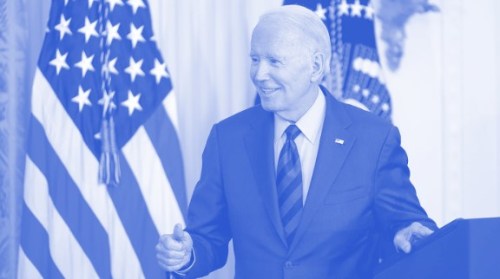Washington state ‘nail-biter’ key to Democrats’ efforts to flip House
A rematch in Washington state is shaping up to be one of the key races to determine who controls the House in November, as first-term incumbent Rep. Marie Gluesenkamp Perez (D) faces off for a second time against Trump-backed Republican Joe Kent in a district that went for the former president in 2020.
Gluesenkamp Perez pulled off an upset in the midterms when she defeated Kent and flipped Washington’s red-leaning 3rd Congressional District. Now, she’s looking to fend off a challenge from Kent as her party fights to win the lower chamber.
The contest looks set to be a “nail-biter” in November, said Mark Stephan, a political science professor at Washington State University, after Gluesenkamp Perez and Kent were separated by single digits when they emerged from the state’s nonpartisan primary last week.
“Anywhere from a dozen to two dozen races around the country will decide whether the House is with the Democrats or with the Republicans,” Stephan said. “And for that reason, Gluesenkamp Perez needs to win. She has to win, from the party’s perspective. They really need her to hold this district.”
Gluesenkamp Perez, the former co-owner of an auto repair shop, was a political unknown when she and Kent, a retired Green Beret endorsed by former President Trump, boxed then-incumbent Rep. Jaime Herrera Beutler (R-Wash.) out of the midterm primary. Herrera Beutler, who’d held the seat for more than a decade, was one of just 10 House GOP lawmakers who voted to impeach Trump in January 2021 following the riots at the Capitol.
The Democrat eked out a win to capture the seat that November, coming in just a point ahead of Kent. She’s now one of a small handful of House Democrats up for reelection in districts Trump won in 2020, alongside Reps. Jared Golden (Maine), Marcy Kaptur (Ohio) and Mary Peltola (Alaska).
The southwest Washington district leans conservative, “but not so much that a Republican can just easily win the district,” Stephan said, pointing to the 2022 results. “Nor is it a situation where Democrats can win and expect that ‘Well, we’ve switched the district over, now it’s going to be a Democratic district.’”
Decision Desk HQ’s map labels the seat as “lean Republican,” while the nonpartisan political handicapper Cook Political Report considers the district a toss-up. The district, whose lines were redrawn after the 2010 census, includes Vancouver, a city just north of progressive Portland, Ore., and stretches toward the Pacific coast.
In last week’s top-two primary, the Democrat led with 46 percent support to Kent’s 39 percent. Another Republican contender, Camas City Council member Leslie Lewallen, brought in 12 percent.
The race is shaping up to be a retread of 2022 in more ways than one. Kent is again touting his support from former President Trump, while Gluesenkamp Perez is pitching herself as representative of the working people of the district, regardless of party.
But the race has been getting “contentious” as both candidates try “to tighten up their branding and their narrative success to do this again,” said John Wyble, a Washington-based Democratic consultant.
Gluesenkamp Perez hammered Kent after last week’s primary as “the same strange, angry, dangerous bonafide white nationalist I defeated last time,” while she stressed her bipartisan voting record. She’s ranked among the top 20 House lawmakers on the Lugar Center and the Georgetown University McCourt School of Public Policy’s 2023 Bipartisan Index, a tool measuring how much members of Congress reach across party lines on legislation.
“Whether you’re progressive or conservative, moderate or independent, Republican or Democrat, or don’t feel like any label fits you well, I want to earn your vote,” she said in a statement.
But she’s also faced criticism from within her own party for voting against President Biden’s student loan forgiveness plan last year and moving to undo Biden’s pause on weapon shipments to Israel this spring. At the same time, her rival is working to tie her to progressives and the Biden administration, knocking her for inflation and the border.
“Marie Perez is desperately trying to make this race about rhetoric b/c she can’t defend her record of supporting Biden/Harris’s destructive agenda,” Kent argued last week in a post on the social platform X.
In a sign of the thorny politics Gluesenkamp Perez must navigate, she became one of the first sitting House Democrats to publicly distance herself from Biden when he was still the presumptive nominee, predicting that he would lose. Since then, she has kept Vice President Harris, the newly minted Democratic presidential nominee, at arm’s length.
“To some degree, [Gluesenkamp Perez is] going to rely on putting some distance between herself and the Democratic ticket, because she’s going to have to get, probably, some voters that are going to be Trump’s voters,” said Ben Anderstone, a progressive political strategist based in Seattle. He noted, though, that Harris “is probably going to make Democrats take less distance than Biden was toward the end there.”
Alex Hays, a GOP consultant in Washington state, was skeptical about whether Gluesenkamp Perez’s attempts to make her campaign represent “a different sort of Democrat” would help her clinch victory in November.
“The amount that voters are paying attention to these ways in which Gluesenkamp differentiates herself from the broader Democratic Party, I just don’t see voters doing that much anymore,” Hays said.
“She’s counting on basically one-fifth of the Republican vote not voting Republican. And in the last election, they were kind of disgusted, so they sat out. In this election … that sense of disgust is way down,” Hays said.
He argued Kent’s 2022 campaign had to be “more divisive” in the primary as he worked to oust fellow Republican Herrera Beutler, while this year his campaign has appeared “much calmer” and could make the GOP bid more appealing to voters who were turned off two years ago.
A recent forecast from Decision Desk HQ looks worrisome for the incumbent, giving Kent a 68 percent chance of winning the district this fall. A July poll from the Northwest Progressive Institute showed the pair “effectively tied,” The Columbian reported.
Still, Washington-based political analyst Ron Dotzauer said Gluesenkamp Perez should feel “buoyed” by the recent primary results. He pointed to the 12 percent brought in by GOP candidate Lewallen as a “protest vote” against Kent and cautioned that Kent shouldn’t count on those voters automatically moving into his column this fall.
“She already beat this guy two years ago, so she knows how to beat him,” Dotzauer said of Gluesenkamp Perez. “It’s not over, but she’s in a pretty good position to get reelected in a district that’s not that easy.”
Whatever happens in November, strategists seem to agree that the race will be close.
“I think a toss-up is probably the best the Democrats could hope for out of this race,” Anderstone said.
“The fact that this race looks as competitive as it does in the primary is a really strong indicator it is really going to be a barn burner in November that should get the party’s attention,” he added.
Copyright 2023 Nexstar Media Inc. All rights reserved. This material may not be published, broadcast, rewritten, or redistributed.





